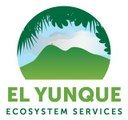New Ecosystem Services project looks at land use changes in the El Yunque region.
El Yunque National Forest, located in eastern Puerto Rico, provides a variety of ecosystem services—including clean air, water, and recreation—that are essential to the well-being of people in communities surrounding the forest and beyond. Rapid changes in urban and built-up areas in eastern Puerto Rico have put El Yunque under high pressure for urban development. These changes can alter forest processes and functions, and thus the services provided by the forest. Zoning regulations for guiding urban expansion and minimizing its effects on the forest have had limited success; much of the urban expansion during the past decades has occurred within zoning districts where urban uses were not originally planned. This limited success has resulted from poor enforcement of zoning regulations; it could also be a result of the implementation of top-down models of land use and resource management that often excludes people at different levels, such as local communities and other stakeholders.
To begin to address these issues, we developed a study that incorporated the views and perspectives of different stakeholders regarding the ecosystem services provided by El Yunque. We developed a methodology that integrates different research methods and participatory techniques. The techniques can help natural resource managers, specialists, and researchers of other national and state forests better understand peoples’ knowledge and awareness of ecosystem services and the factors affecting these services. The techniques and the products resulting from them can be used to assist in the management and planning of land use, ecosystem services, and natural resources in general.
For more information go to: http://www.interfacesouth.org/projects/el-yunque
News Source:
READ MORE from InterfaceSouth: Centers for Urban and Interface Forestry >>
News Category:
RESEARCH
Explore Further


